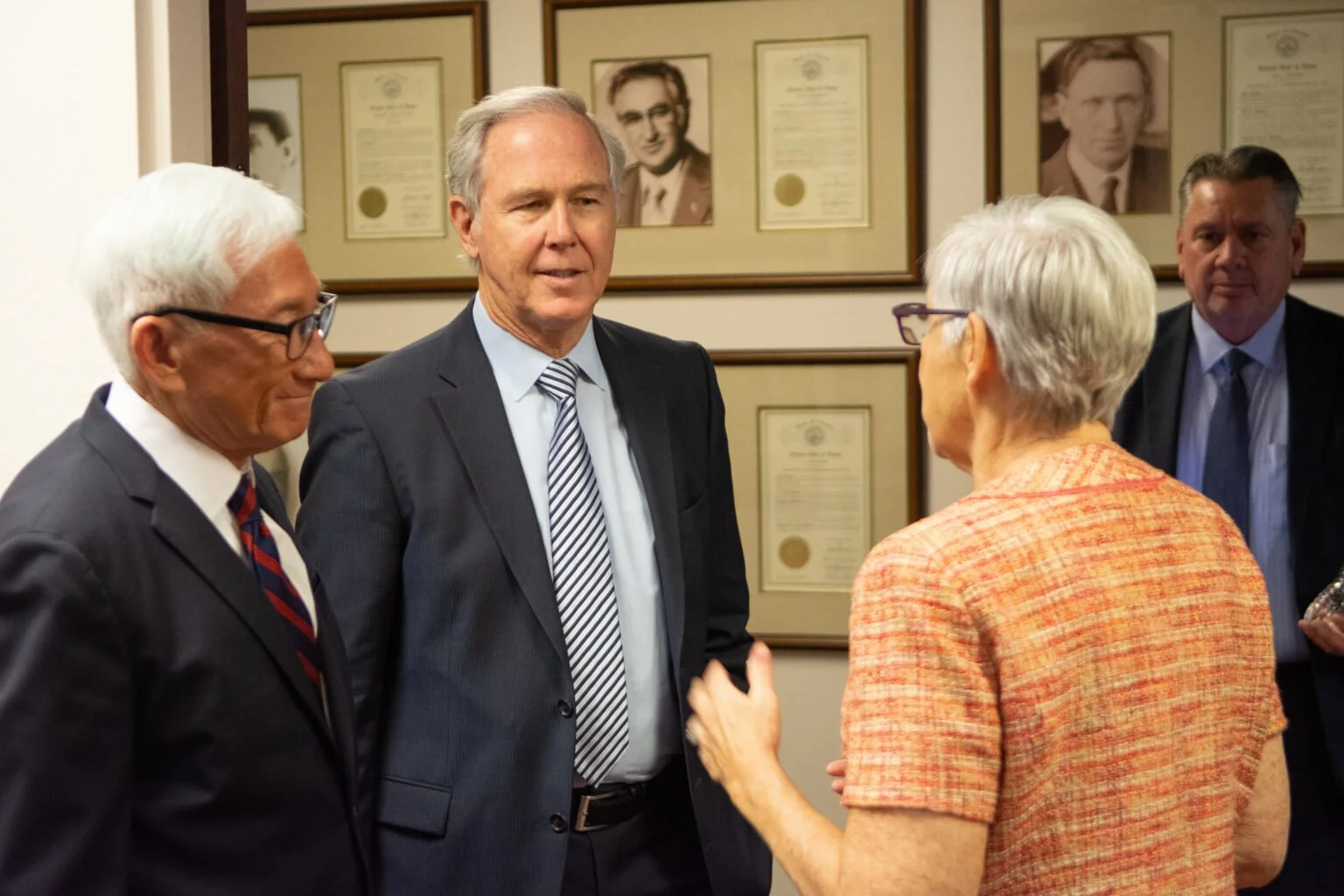Is Vegas set to be the new Hollywood?
By Keith Griffith | Published May 12, 2023
Brandon Birtcher, center, co-owner and CEO of Birtcher Development and consultant Victor Wei, left, greet Sen. Roberta Lange (D-Las Vegas) inside the Senate Leadership office at the Legislature on Thursday, May 11, 2023, in Carson City. (David Calvert/The Nevada Independent)
After luring the Oakland A's and filmmaker Mark Wahlberg away from California, Las Vegas has its sights set on wooing major movie studios with huge proposed tax credits.
On Thursday, a bipartisan group of Nevada lawmakers introduced a bill that would give massive tax credits aimed at luring film production to the Las Vegas area, including a proposed $1 billion Sony expansion.
It's the latest attempt at diversifying southern Nevada's gaming and tourism-reliant economy, which was hit hard by the pandemic.
The $190 million annually in tax credits for 20 years would be the largest proposed tax incentive package in recent state history.
In a statement, a Sony spokesperson said the company is supportive of the film industry's expansion into southern Nevada and would commit up to $1 billion on production over the next decade 'pending the passage of legislation guaranteeing a competitive Nevada production incentive.'
It follows a winning streak for Nevada, which has made strides in luring businesses and top talent from neighboring California's much larger economy.
In January, Tesla said it intends to invest $3.6 billion to expand manufacturing capabilities in Nevada, where the company already manufactures batteries in a 'Gigafactory' east of Reno-Sparks.
Last month, the Oakland Athletics MBL franchise announced plans to relocate to a planned new stadium on the Las Vegas Strip, following a similar move by the NFL's Raiders in 2020.
And the actor and filmmaker Mark Wahlberg is among the high-profile Californians to relocate to Las Vegas in search of better business opportunities and improved quality of living.
'It's really giving the kids a chance to thrive,' the 51-year-old father of four told Fox News Digital of the move earlier this year, after selling his Los Angeles home and moving to Las Vegas.
'There's lots of opportunity here as well for me,' he added. 'We're trying to create a studio. We're trying to build the shoe factory. We want to create lots of jobs here.'
In August last year, Wahlberg purchased a 7,327 square foot two-story townhome in Las Vegas for $14.5 million, according to the Las Vegas Review-Journal.
The property is part of The Summit Club, which boasts a golf course and plenty of other luxury homes.
He had previously purchased 2.5 acres of land for $15.6 million in July 2022 that he planned to build out.
Nevada's proposed film tax credit follows recent deals with Tesla and Redwood Materials that totaled hundreds of millions of dollars each.
But unlike those deals, which used direct tax abatements, these tax credits would only be awarded upon completion of the films at studios built by private developers. The legislation would involve the state entering an agreement with private developers who would pay for two film production sites - one on the campus of the University of Nevada, Las Vegas and another in the Summerlin area of Las Vegas.
'It creates a whole new industry in Nevada,' the bill's sponsor, Democratic state Sen. Roberta Lange of Las Vegas, said in an interview Thursday. 'I think it helps build and diversify our economy, which is something we´ve talked about in Nevada for as long as I´ve lived here.'
Even with a hearing scheduled for Tuesday, the bill faces a tight deadline and further complicates the final month of Nevada's legislative session, where Republican Gov. Joe Lombardo has sparred with the Democratic-controlled Legislature on its historic $11.6 billion budget.
It also comes as a funding bill to bring the Oakland A's to Las Vegas is expected to drop any day. The A's originally asked for $500 million in public assistance for a $1.5 billion stadium site, but have reportedly lowered that number.
A spokesperson for Lombardo, who promised no new taxes on the campaign trail, declined to comment on the film production tax credits bill.
Under the bill, production companies would apply for the transferable tax credits, which are used to offset the modified business tax, insurance premium tax or gaming license fee.
The tax credits could be 30 percent of production and construction cost for films - up from the current 15 percent threshold. Part of those tax credits would fund local workforce training and educational programs for jobs that the studios create.
The developers of the UNLV and Summerlin sites would foot the bill for development of the production studios, projected at $500 million and $400 million respectively by 2030.
'The risk is really on the developers, not on the state of Nevada,' said Republican Senate Minority Leader Heidi Seevers Gansert, of Reno, who co-sponsored the bill.
Brandon Birtcher, co-owner of Birtcher Development, which is developing the UNLV site, said it's still being determined which film or content creator would use his site. Sony is planned for the Summerlin site, run by the Howard Hughes Corporation.
Tax incentives for some of the nation's largest companies have become a major driver of recent efforts to diversify Nevada's economy.
The Las Vegas area was hit particularly hard during the pandemic as it is particularly reliant on casinos and tourism.
In northern Nevada, major tax incentives have focused on the US transition to green energy.
The governor's economic development office awarded Tesla $330 million in tax abatements in March for a multi-billion dollar expansion near Reno.
The state also granted $105 million in tax incentives to Redwood Materials in December, for a massive lithium battery recycling plant in northern Nevada.
Article Link: https://www.dailymail.co.uk/news/article-12077409/Nevada-mulls-massive-tax-credits-lure-film-industry-Las-Vegas.html

